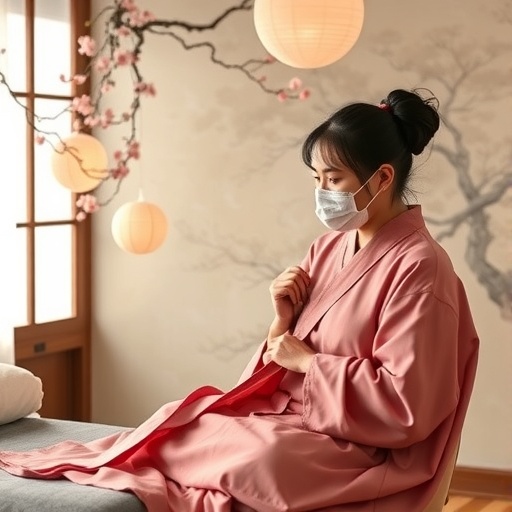In the vast realm of health and wellness, the integration of traditional practices with modern scientific methodologies offers a unique perspective on patient care, especially in the context of Traditional Chinese Medicine (TCM). A recent systematic critical review underscores the importance of placebo settings in trials of TCM nursing techniques, a topic that has stirred considerable debate in both medical and lay communities alike. Understanding the implications of this review not only sheds light on the practices that have shaped healthcare for millennia but also raises pertinent questions about the validity and efficacy of these approaches in today’s clinical landscape.
Traditional Chinese Medicine has long been revered for its holistic approach to healing, emphasizing the balance of mind, body, and spirit. Practitioners employ a range of techniques, from acupuncture and herbal medicine to nursing care that incorporates elements of TCM philosophy. However, as TCM gains traction in Western medical settings, the need for rigorous scientific evaluation becomes increasingly critical. This is where the analysis of placebo settings plays a vital role, as it directly impacts the interpretation of results from clinical trials.
Placebo settings in clinical research serve to establish a baseline understanding of a treatment’s efficacy. In TCM trials, where subjective experiences and individual responses are significant, the challenge lies in creating a truly effective placebo group. The current review presents an in-depth examination of existing trials, analyzing how placebo-controlled environments are structured and whether they accurately reflect the complexities and nuances inherent in TCM practices. By addressing these factors, researchers aim to draw more robust conclusions regarding treatment outcomes and patient satisfaction.
One of the primary findings highlighted in the review is the importance of participant perception within placebo settings. Unlike pharmaceutical trials, where biological markers may serve as concrete evidence of effectiveness, TCM often hinges on subjective experiences, making it essential to understand how participants perceive their treatment. There is a delicate balance between fostering a positive therapeutic environment and ensuring that the placebo effect does not skew the results. This necessitates a rigorous examination of how placebo groups are constructed and monitored throughout the duration of a trial.
Moreover, the review identifies a gap in methodologies employed during TCM research. A large number of trials do not adequately address the placebo phenomenon, which can lead to inflated perceptions of efficacy. The authors advocate for standardized protocols that allow for better comparison across studies and a clearer understanding of how TCM nursing techniques influence patient outcomes. Such standardization could enhance the credibility of TCM in the eyes of skeptics and prove to be a turning point in its acceptance by mainstream medical communities.
The inclusion of qualitative data presents another compelling angle of the review. By not only assessing the quantitative effects of TCM but also delving into patient experiences, the study provides insights into factors such as emotional well-being, perceived quality of life, and psychological resilience. These elements are often overlooked but are crucial for understanding the totality of care in TCM nursing. By synthesizing quantitative and qualitative research, a more comprehensive picture of treatment efficacy emerges that resonates with both healthcare providers and patients.
Furthermore, the review delves into the ethical implications of placebo use in TCM trials. With a rich history steeped in cultural significance, any clinical evaluation of TCM practices must retain sensitivity towards its traditional roots. Manipulating perceptions, even in the context of a placebo group, raises ethical questions regarding the integrity of patient consent and the potential for undermining trust in practitioners. Creating a placebo but maintaining the integrity of the therapeutic environment is a fine line that requires careful navigation by researchers and clinicians alike.
In light of the findings, the authors encourage an interdisciplinary approach that combines insights from psychology, sociology, and traditional medicine. Collaborations between practitioners and researchers could pave the way for innovative trial designs that reflect the complexities of human healing experiences. Engaging with TCM practitioners during the planning stages of research may yield more effective methods of demonstrating efficacy while honoring traditional practices.
Moreover, advocacy for educating both healthcare providers and patients about the role of the placebo effect in TCM is crucial. As patients seek more integrative forms of treatment, understanding how traditional practices align with or diverge from scientific evidence can empower them to make informed health decisions. Empowerment through knowledge can foster a more nuanced appreciation of TCM, potentially leading to increased acceptance and implementation within conventional medical frameworks.
As the review demonstrates, the path forward is still rife with challenges but filled with potential. Rigorous methodologies, transparent reporting, and ethical considerations must inform future trials of TCM nursing techniques. The systematic critical review serves as a call to action for researchers to refine their approaches, ensuring that TCM is subject to the same scrutiny as any form of medical treatment, thereby enhancing its legitimacy and effectiveness.
In conclusion, the intersection of traditional practices and modern medicine necessitates ongoing exploration and dialogue. The critical review on placebo settings in TCM trials prompts a re-evaluation of how these traditional practices can be incorporated into contemporary healthcare paradigms. It also elevates the discourse surrounding the importance of empirical evidence while respecting the cultural heritage that enriches these methods. This synthesis of tradition and evidence-based practice may ultimately not only enhance patient outcomes but also broaden the scope of what we consider effective healthcare in an increasingly diverse and globalized world.
Subject of Research: Traditional Chinese Medicine, placebo settings in clinical trials
Article Title: Placebo setting in trials of traditional Chinese medicine nursing techniques: a systematic critical review
Article References:
Chen, L., Zeng, Y., Zhu, D. et al. Placebo setting in trials of traditional Chinese medicine nursing techniques: a systematic critical review1.
BMC Complement Med Ther 25, 390 (2025). https://doi.org/10.1186/s12906-025-05125-0
Image Credits: AI Generated
DOI: 10.1186/s12906-025-05125-0
Keywords: Traditional Chinese Medicine, placebo effect, nursing techniques, clinical trials, systematic review.




